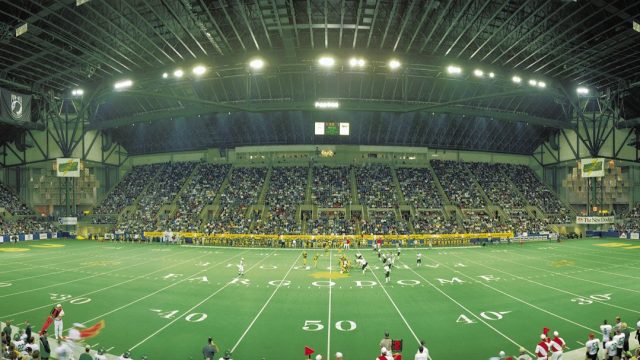Let’s Legalize Gambling but Also Let’s Not Get Too Cute With the Revenues From It

Earlier this year North Dakota lawmakers defeated two pieces of legislation which would have legalized sports gambling in the state.
One would have legalized gambling on collegiate and professional sports; the other would have legalized wagering on the pros only.
Neither bill passed.
Yet other states are legalizing sports betting since the U.S. Supreme Court struck down the Professional and Amateur Sports Protection Act for violating the 10th amendment. Iowa is about to become state number 11 to do so.
Here in North Dakota, it’s state Senator Scott Meyer (R-Grand Forks) who is now leading the charge for legalization. “Let’s not pretend it’s not happening,” he is quoted as saying in a recent Grand Forks Herald profile of the issue. “On ESPN right now, the bottom ticker has betting lines. KFAN Power Trip, I listen to on the radio, they’re talking the over-under. It’s now so mainstream. It doesn’t have that stigma anymore, and I never thought it should have it in the first place. We’re leaving money on the table we could use to fund other things.”
[mks_pullquote align=”right” width=”300″ size=”24″ bg_color=”#ffffff” txt_color=”#000000″]We want our state government to be nimble and efficient. Miring policymakers in political restrictions on how funds can be used is not how you achieve that goal.[/mks_pullquote]
He’s exactly right, and got an endorsement for the cause from the Herald’s editorial board this week. “It would be best to come at it with a relatively high tax that makes it worthwhile for the state, to earmark the proceeds for programs that would be for public good, and then to let the people do what so many of them already are doing — legally and illegally,” the newspaper wrote in an editorial.
The only quibble I’d make with that argument is the “earmark” part.
The only thing revenues from expanded legalization of gambling should be “earmarked” for is whatever is needed to pay for the state to regulate the gambling. Beyond that the revenues should flow into the general fund for our lawmakers to spend.
Earmarking revenues from gambling for a “public good” may be good politics – it can help sway factions in the public who aren’t otherwise interested in gambling – but it’s bad policy. Something we do far too much of in North Dakota.
We are very fond of diverting revenues from various taxes into “buckets” or special funds dedicated for special purposes. This siloing of our state’s financial resources can leave us with situations where real needs are underfunded while other initiatives have a glut of cash from a dedicated revenue source.
Sometimes this can make sense. There’s nothing wrong with tucking some revenues away into reserve funds, especially in a state like North Dakota where revenues can swing wildly based on the prices of crops and oil. Beyond that, lawmakers shouldn’t be handcuffed by well-meaning but short-sighted earmarking of new revenue sources.
If we expand the legalization of gambling in North Dakota – like the Herald I believe such a turn of events is inevitable – put the revenues in the general fund and let our elected leaders decide which “public good” those dollars are used for each new budget cycle.
We want our state government to be nimble and efficient.
Miring policymakers in political restrictions on how funds can be used is not how you achieve that goal.
By the way, if we do expand legal gambling in North Dakota, we ought to break the monopoly charities have over it in the state and let both tribal interests (which are already operating casinos on reservations) and for-profit companies into the marketplace. We should also allow gambling on collegiate sports. The North Dakota University System opposed that, expressing concerns about pressure put on student athletes, but that’s a bit rich given how universities already profit off the mostly uncompensated efforts of the players.
If that’s really a concern, let’s get big-time collegiate sports off campus, but I digress.
These caveats are probably not palatable to some politically, but it would be the right way to do it.




